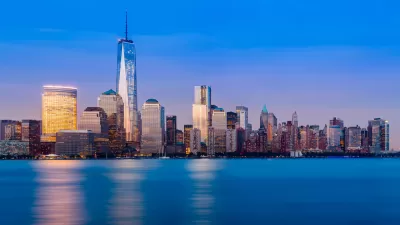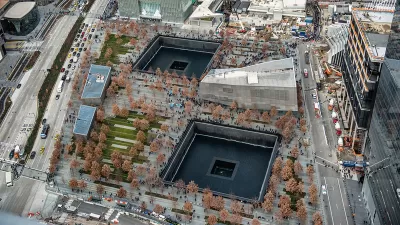After years of debate and negotiation, the redevelopment of the World Trade Center site finally appears to be going forward. But there is considerable doubt as to its economic viability, writes Eliot Brown.
Brown points out that the original WTC took decades to prove viable, and only because of enormous public subsidies. Now the new deal to redevelop the site is also set to put perhaps billions of dollars of public money behind the project -- and without any real demand for vast amount of office space it will create.
"A yearlong battle over the World Trade Center site between private developer Larry Silverstein, the Port Authority and the city seems to be ending...While the details are still under discussion and talks could yet break down, it would put hundreds of millions, if not billions, of additional public dollars at risk, as some combination of the Port Authority, the city and the state would likely back the financing on the bulk of the $4 billion–plus cost of the two privately built towers.
[N]early 7 million square feet, or two and a half Empire State Buildings, [would be] constructed within the span of a few years on one site-all with only a single private tenant in place, China-based Beijing Vantone, for a relatively trivial 190,000 square feet, or six floors."
FULL STORY: The Business of Ground Zero

Planetizen Federal Action Tracker
A weekly monitor of how Trump’s orders and actions are impacting planners and planning in America.

Chicago’s Ghost Rails
Just beneath the surface of the modern city lie the remnants of its expansive early 20th-century streetcar system.

San Antonio and Austin are Fusing Into one Massive Megaregion
The region spanning the two central Texas cities is growing fast, posing challenges for local infrastructure and water supplies.

Since Zion's Shuttles Went Electric “The Smog is Gone”
Visitors to Zion National Park can enjoy the canyon via the nation’s first fully electric park shuttle system.

Trump Distributing DOT Safety Funds at 1/10 Rate of Biden
Funds for Safe Streets and other transportation safety and equity programs are being held up by administrative reviews and conflicts with the Trump administration’s priorities.

German Cities Subsidize Taxis for Women Amid Wave of Violence
Free or low-cost taxi rides can help women navigate cities more safely, but critics say the programs don't address the root causes of violence against women.
Urban Design for Planners 1: Software Tools
This six-course series explores essential urban design concepts using open source software and equips planners with the tools they need to participate fully in the urban design process.
Planning for Universal Design
Learn the tools for implementing Universal Design in planning regulations.
planning NEXT
Appalachian Highlands Housing Partners
Mpact (founded as Rail~Volution)
City of Camden Redevelopment Agency
City of Astoria
City of Portland
City of Laramie





























